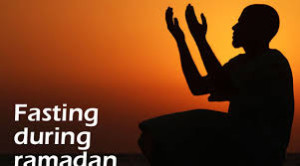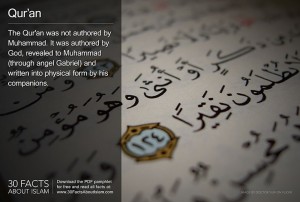Ramadan Mubarak (“May God give you a blessed month”) on June 6thm 2016 or in Arabic this would be رمضان مبارك
The time for Ramadan is set by the lunar cycle and so is different each year.
From Wikipedia, the free encyclopedia:
 Chapter 2, Revelation 185, of the Quran states: “The month of Ramadan is that in which was revealed the Quran; a guidance for mankind, and clear proofs of the guidance, and the criterion (of right and wrong). And whosoever of you is present, let him fast the month, and whosoever of you is sick or on a journey, a number of other days. Allah desires for you ease; He desires not hardship for you; and that you should complete the period, and that you should magnify Allah for having guided you, and that perhaps you may be thankful.”
Chapter 2, Revelation 185, of the Quran states: “The month of Ramadan is that in which was revealed the Quran; a guidance for mankind, and clear proofs of the guidance, and the criterion (of right and wrong). And whosoever of you is present, let him fast the month, and whosoever of you is sick or on a journey, a number of other days. Allah desires for you ease; He desires not hardship for you; and that you should complete the period, and that you should magnify Allah for having guided you, and that perhaps you may be thankful.”
 Ramadan is the ninth month of the Islamic calendar, and is observed by Muslims worldwide as a month of fasting to commemorate the first revelation of the Quran to Muhammad according to Islamic belief. This annual observance is regarded as one of the Five Pillars of Islam. The month lasts 29–30 days based on the visual sightings of the crescent moon, according to numerous biographical accounts compiled in the hadiths.
Ramadan is the ninth month of the Islamic calendar, and is observed by Muslims worldwide as a month of fasting to commemorate the first revelation of the Quran to Muhammad according to Islamic belief. This annual observance is regarded as one of the Five Pillars of Islam. The month lasts 29–30 days based on the visual sightings of the crescent moon, according to numerous biographical accounts compiled in the hadiths.
 A hadith is one of various reports describing the words, actions, or habits of the Islamic prophet, Muhammad. Hadith are second only to the Quran in developing Islamic jurisprudence (divine law) and regarded as important tools for understanding the Quran and commentaries (tafsir) written on it. The time for Ramadan is set by the lunar cycle and so is different each year. A common purely lunar calendar is the Islamic (or Hijri Qamari) calendar. A feature of the Islamic calendar is that a year is always 12 months, so the months are not linked with the seasons and drift each solar year by 11 to 12 days. It comes back to the position it had in relation to the solar year approximately every 33 Islamic years.
A hadith is one of various reports describing the words, actions, or habits of the Islamic prophet, Muhammad. Hadith are second only to the Quran in developing Islamic jurisprudence (divine law) and regarded as important tools for understanding the Quran and commentaries (tafsir) written on it. The time for Ramadan is set by the lunar cycle and so is different each year. A common purely lunar calendar is the Islamic (or Hijri Qamari) calendar. A feature of the Islamic calendar is that a year is always 12 months, so the months are not linked with the seasons and drift each solar year by 11 to 12 days. It comes back to the position it had in relation to the solar year approximately every 33 Islamic years.
 The word Ramadan comes from the Arabic root ramiḍa or ar-ramaḍ, which means scorching heat or dryness. Fasting is fardh (obligatory) for adult Muslims, except those who are suffering from an illness, travelling, are elderly, pregnant, breastfeeding, diabetic or going through menstrual bleeding. Fasting the month of Ramadan was made obligatory in the second year after the Muslims migrated from Mecca to Medina (623 CE, CE stands for Common Era).
The word Ramadan comes from the Arabic root ramiḍa or ar-ramaḍ, which means scorching heat or dryness. Fasting is fardh (obligatory) for adult Muslims, except those who are suffering from an illness, travelling, are elderly, pregnant, breastfeeding, diabetic or going through menstrual bleeding. Fasting the month of Ramadan was made obligatory in the second year after the Muslims migrated from Mecca to Medina (623 CE, CE stands for Common Era).
 While fasting from dawn until sunset, Muslims refrain from consuming food, drinking liquids, smoking, and engaging in sexual relations. Muslims are also instructed to refrain from sinful behavior that may negate the reward of fasting, such as false speech (insulting, backbiting, cursing, lying, etc.) and fighting. Food and drink is served daily, before dawn and after sunset. Spiritual rewards (thawab) for fasting are also believed to be multiplied within the month of Ramadan. Fasting for Muslims during Ramadan typically includes the increased offering of salat (prayers) and recitation of the Quran.
While fasting from dawn until sunset, Muslims refrain from consuming food, drinking liquids, smoking, and engaging in sexual relations. Muslims are also instructed to refrain from sinful behavior that may negate the reward of fasting, such as false speech (insulting, backbiting, cursing, lying, etc.) and fighting. Food and drink is served daily, before dawn and after sunset. Spiritual rewards (thawab) for fasting are also believed to be multiplied within the month of Ramadan. Fasting for Muslims during Ramadan typically includes the increased offering of salat (prayers) and recitation of the Quran.
 It is believed that the Quran was first revealed to Muhammad during the month of Ramadan which has been referred to as the “best of times”. The first revelation was sent down on Laylat al-Qadr (The night of Power) which is one of the five odd nights of the last ten days of Ramadan. According to hadith, all Holy Scriptures were sent down during Ramadan. The tablets of Ibrahim, the Torah, the Psalms, the Gospel and the Quran were sent down on 1st, 6th, 12th, 13th and 24th Ramadan respectively.
It is believed that the Quran was first revealed to Muhammad during the month of Ramadan which has been referred to as the “best of times”. The first revelation was sent down on Laylat al-Qadr (The night of Power) which is one of the five odd nights of the last ten days of Ramadan. According to hadith, all Holy Scriptures were sent down during Ramadan. The tablets of Ibrahim, the Torah, the Psalms, the Gospel and the Quran were sent down on 1st, 6th, 12th, 13th and 24th Ramadan respectively.
The end of Ramadan is ‘Eid al-Fitr which is the Feast of the Breaking of the Fast. A greeting for this special holy day is Id Mubarak (“May God make it a blessed feast.”)


Speak Your Mind